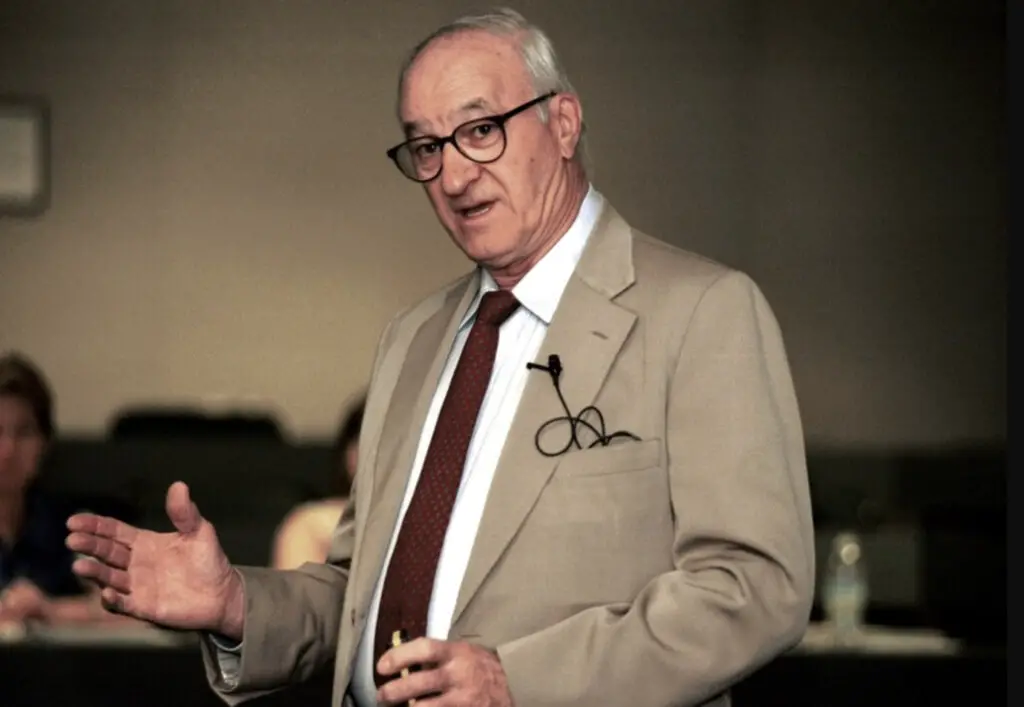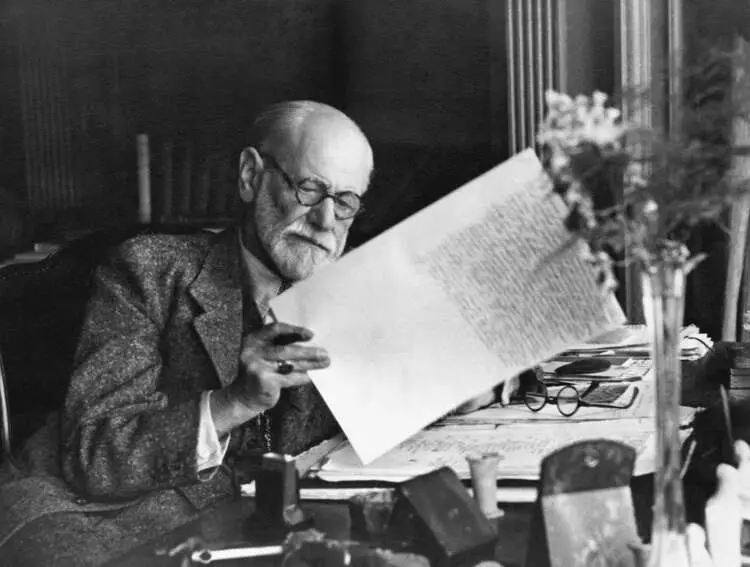Albert Bandura was a highly respected psychologist who put forward revolutionary ideas nobody else had before. He passes away in 2021 at his home in California. A 2002 study conducted by APA ranked him as the fourth most eminent psychologist of the 20th century based on journal citations, introduction in textbooks, and surveys.
This article will present the 20 most important facts about Albert Bandura’s life and his psychological theories.
1. Early life
Albert Bandura was born on the 4th of December 1925 in Mundare, a small town from Canada. He is the sixth and also youngest child in his family. Out of all the children, he is the only son. His father was born in Poland, while his mother was born in Ukraine. However, both of them immigrated to Canada at a young age and moved to Mundare when they got married.
2. Education
Bandura studied at a badly-equipped school which made students assume full responsibility of their education. He graduated in 1946 and enrolled at the University of British Columbia. Three years later, he graduated with the Bolocan Award in psychology. Later, at the University of Iowa, he completed some graduate work. As a result, in 1951 he received a master’s degree in the same field (psychology). The next year, he got a doctorate in clinical psychology.
3. Career life
After graduating from high school, during summer, the psychologist worked in Yukon (a Canadian territory). The main aim of his job was to avoid the sinking of the Alaska Highway. This experience contributed to his future, as he believes that his work in the northern tundra is the reason why he started to become interested in human psychopathology. In 1953, at Stanford University, Bandura was given a one-year instructorship. He accepted the offer. As a result, he got a job as a professor there. In 1974, Albert became the David Starr Jordan Professor of Social Science in Psychology. In 1976, he occupied the position of chairman of the psychology department. He decided to keep working at Stanford University. In 2010, he became professor emeritus.
4. Marriage and children
Bandura arrived in the United States when he was 24 years old. He went on to do an internship after receiving his doctorate, when he met Virginia Varns (“Ginny”), who was a supervisor of a hospital not far away. They got married in 1952 and became parents shortly after. Their first daughter, Mary, was born in 1954; Carol was born in 1957. Virginia died peacefully in 2011, at the age of 89.
Learn more about: B.F. Skinner’s Contribution to Psychology
5. The Bobo Doll Experiment
One of the most important things Albert is known for is the Bobo doll experiment, performed in 1961. It consisted of physical and verbal abuse done to an inflatable doll by some researchers, while preschool-age children watched. The latter were divided into three groups, and each one of them assisted in different situations. The groups themselves got divided into smaller groups based on gender. The experiment consisted of three stages. The conclusions drawn at the end of it stand as proof that children can learn through the observation of adult behaviour and imitate it. Moreover, the experiment showed that although the results are similar regardless of gender, boys are slightly more prone to imitate physical aggression. Still, there wasn’t a contrast between genders when it came to the mimicry of verbal violence.
6. Self efficacy and its role in our life
Albert Bandura put forward the concept of self efficacy, which represents “the belief in one’s capabilities to organize and execute the courses of action required to manage prospective situations.” He thinks that it plays a determinant role in our way of feeling, thinking and behaving. It also makes us decide our goals, how we work towards them, and our perspective of the results. Consequently, people with more self efficacy are more interested in their activities and are more committed to them. In contrast, people with low self efficacy don’t take on challenging activities, are not sure about their abilities, and focus on failure.
7. The power of violence on TV
One of the many people who quickly got interested in the effect of television since its rise in popularity was Albert Bandura. He accepted the offer of two commissions and some congressional committees to confirm its negative impact. His statement convinced the Federal Trade Commission to consider performances of children partaking in risky activities as unacceptable. Additionally, this decision led to the implementation of new advertising standards.
8. Social learning theory
The social learning theory (later changed to “social cognitive theory”) has an extended background and its elements were studied by many specialists in this field, including B. F. Skinner. However, unlike his peers, Albert Bandura focuses on the role of analysing, modelling, and mimicking the behaviours, attitudes, and emotional reactions of other people. He studied learning processes that happened in interpersonal situations and were not explained enough by previous theories.
9. Self-control therapy
His social cognitive theory became the base of a type of therapy known as “self-control therapy”, which primarily helps resolve habits including smoking, overeating etc. This therapy implies having a diary where you write how many times you do this thing, when and where. After analyzing the main cues that lead to these activities, they need to be avoided or removed from your life. When things start to get better, you can reward yourself.
Learn more about Jean Piaget’s Contribution to Psychology
10.Modeling therapy
The most popular type of therapy put forward by Albert is modeling therapy. It states that if you can get a person with a psychological disorder to analyze someone else dealing with the same issues in a more productive fashion, the first one will learn by imitating the second.
11. View on education
Bandura’s social cognitive theory has a significant impact on both students and teachers. In education, you can see that some of his ideas have been implemented, including those related to self efficacy. They help teachers and students set higher goals and teach them how to commit to their plans more easily.
12. A creator of plenty of great quotes
Being an inventor of many theories means that Albert’s publications contain some nicely put sentences, too, and a lot of them are related to self-efficacy. A great example is “Self-belief does not necessarily ensure success, but self-disbelief assuredly spawns failure.” (From Self-efficacy: The Exercise of Control, 1997)
13. Barack Obama handed him an award
On the 19th of May 2016, President Barack Obama awarded Albert Bandura the National Medal of Science. The ceremony took place at the White House. This honor is given to specialists in science, engineering, and technology who greatly influenced these fields.
14. Other awards
Albert’s work has been praised and awarded many times. So far, he has received over 16 honorary degrees from different universities. In 1980, the psychologist became a Fellow of the American Academy of Arts and Sciences. Besides the National Medal of Science, among the awards he received are the Award for Distinguished Scientific Contributions and the Thorndike Award for Distinguished Contributions of Psychology to Education.
Learn more about Sigmund Freud’s Contribution to Psychology
15. He ranked fourth in the list of the most eminent psychologists of the 20th century
Bandura is widely known as an important personality in the field of psychology. For instance, in 2002, a scientific journal known as “Review of General Psychology” considered Albert the fourth most eminent psychologist of the 20th century.
16. Publications
Albert’s books are often read by people who are interested in psychology and want to dive deeper into the subject. “Self-efficacy: the exercise of control” and “Social Foundations of Thought and Action: A Social Cognitive Theory” – two of his major works – have more than 5,000 citations in Google Scholar.
17. Family – a determinative part of the psychologist’s future
Bandura’s parents had always encouraged their son to take risks and to embark on new adventures. The restrictions of education caused by living in a small town led Bandura to become both self-reliant and self-motivated, two qualities that helped him later in life.
18. Is he a behaviorist?
Despite the fact that many textbooks add his theory to the list of those related to behaviorism, Albert stated that he “…never really fit the behavioral orthodoxy”. He says that people misinterpret his approach and label it as rooted in behaviorism.
19. What did he do late in life?
Until very late in his life, Bandura didn’t stop his work in psychology and conducted research and taught at Stanford University.
20. Influence and legacy
Albert Bandura’s work, similarly to that of many other psychologists, determined the future of various domains. Education, in particular, has evolved thanks to him, as the social learning theory helps students reach their capacity in the classroom. Furthermore, his theories led to the development of different branches of psychology, including the personality one.
Now that we got to know more about this honorable man and his work, we can state with no doubt that Albert Bandura’s research has been a pillar of the evolution of psychology for many years. The concept of self efficacy particularly helped many people improve their lives and accomplish their wildest dreams.
References: Wikipedia 1, Britannica 1, VeryWell Mind 1, Lasting Memories, Britannica 2, VeryWell Mind 2, Wikipedia 2, Simply Psychology, Webspace.ship.edu, VeryWell Mind 3, Association for Psychological Science, Uky.edu, Developmental Standards




